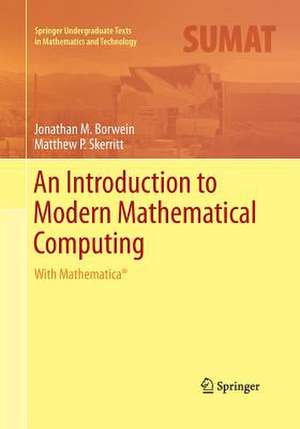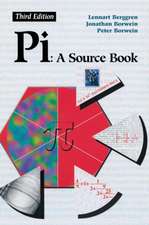An Introduction to Modern Mathematical Computing: With Mathematica®: Springer Undergraduate Texts in Mathematics and Technology
Autor Jonathan M. Borwein, Matthew P. Skerritten Limba Engleză Paperback – 23 aug 2016
We intend to persuade that Mathematica and other similar tools are worth knowing, assuming only that one wishes to be a mathematician, a mathematics educator, a computer scientist, an engineer or scientist, or anyone else who wishes/needs to use mathematics better. We also hope to explain how to become an "experimental mathematician" while learning to be better at proving things. To accomplish this our material is divided into three main chapters followed by a postscript. These cover elementary number theory, calculus of one and several variables, introductory linear algebra, and visualization and interactive geometric computation.
| Toate formatele și edițiile | Preț | Express |
|---|---|---|
| Paperback (2) | 358.32 lei 38-44 zile | |
| Springer – 23 aug 2016 | 358.32 lei 38-44 zile | |
| Springer – 23 aug 2016 | 421.72 lei 43-57 zile | |
| Hardback (2) | 393.52 lei 43-57 zile | |
| Springer – 15 iul 2011 | 393.52 lei 43-57 zile | |
| Springer – 4 aug 2012 | 429.06 lei 43-57 zile |
Din seria Springer Undergraduate Texts in Mathematics and Technology
- 13%
 Preț: 357.85 lei
Preț: 357.85 lei -
 Preț: 412.77 lei
Preț: 412.77 lei -
 Preț: 499.87 lei
Preț: 499.87 lei -
 Preț: 407.37 lei
Preț: 407.37 lei - 15%
 Preț: 494.43 lei
Preț: 494.43 lei -
 Preț: 377.88 lei
Preț: 377.88 lei -
 Preț: 413.88 lei
Preț: 413.88 lei - 13%
 Preț: 388.57 lei
Preț: 388.57 lei - 17%
 Preț: 365.99 lei
Preț: 365.99 lei - 17%
 Preț: 367.30 lei
Preț: 367.30 lei - 19%
 Preț: 465.39 lei
Preț: 465.39 lei -
 Preț: 998.07 lei
Preț: 998.07 lei -
 Preț: 391.61 lei
Preț: 391.61 lei - 15%
 Preț: 487.90 lei
Preț: 487.90 lei -
 Preț: 391.79 lei
Preț: 391.79 lei -
 Preț: 472.90 lei
Preț: 472.90 lei -
 Preț: 422.03 lei
Preț: 422.03 lei - 15%
 Preț: 482.97 lei
Preț: 482.97 lei -
 Preț: 246.75 lei
Preț: 246.75 lei -
 Preț: 410.46 lei
Preț: 410.46 lei -
 Preț: 407.57 lei
Preț: 407.57 lei - 15%
 Preț: 522.34 lei
Preț: 522.34 lei - 15%
 Preț: 486.91 lei
Preț: 486.91 lei -
 Preț: 421.91 lei
Preț: 421.91 lei - 20%
 Preț: 338.50 lei
Preț: 338.50 lei -
 Preț: 660.93 lei
Preț: 660.93 lei - 15%
 Preț: 504.99 lei
Preț: 504.99 lei - 20%
 Preț: 424.22 lei
Preț: 424.22 lei - 15%
 Preț: 487.74 lei
Preț: 487.74 lei -
 Preț: 460.91 lei
Preț: 460.91 lei -
 Preț: 1072.26 lei
Preț: 1072.26 lei -
 Preț: 390.73 lei
Preț: 390.73 lei - 19%
 Preț: 474.42 lei
Preț: 474.42 lei
Preț: 421.72 lei
Nou
Puncte Express: 633
Preț estimativ în valută:
80.72€ • 87.71$ • 67.85£
80.72€ • 87.71$ • 67.85£
Carte tipărită la comandă
Livrare economică 21 aprilie-05 mai
Preluare comenzi: 021 569.72.76
Specificații
ISBN-13: 9781493942954
ISBN-10: 1493942956
Pagini: 224
Ilustrații: XVI, 224 p.
Dimensiuni: 178 x 254 mm
Greutate: 0.43 kg
Ediția:Softcover reprint of the original 1st ed. 2012
Editura: Springer
Colecția Springer
Seria Springer Undergraduate Texts in Mathematics and Technology
Locul publicării:New York, NY, United States
ISBN-10: 1493942956
Pagini: 224
Ilustrații: XVI, 224 p.
Dimensiuni: 178 x 254 mm
Greutate: 0.43 kg
Ediția:Softcover reprint of the original 1st ed. 2012
Editura: Springer
Colecția Springer
Seria Springer Undergraduate Texts in Mathematics and Technology
Locul publicării:New York, NY, United States
Cuprins
Preface.- Conventions and Notation.- 1. Number Theory.- 2. Calculus.- 3. Linear Algebra.- 4. Visualisation and Geometry: a Postscript.- Sample Quizzes.- Index.- References.-
Recenzii
From the reviews:
“There are two general approaches to computation: using computation as a numerical tool to approximate answers or using a computer algebra system to provide exact mathematical answers by symbolic manipulation. This book explores the second of these approaches, using the computer algebra system Mathematica. … Though this work does teach students how to use Mathematica, it does so with the goal of providing new insights into basic mathematics, which can then be applied to more advanced mathematics. … Summing Up: Recommended. Lower- and upper-division undergraduates.” (D. Z. Spicer, Choice, Vol. 50 (7), March, 2013)
“Three main chapters form the core of the book. In the first chapter, the authors talk about using a computer algebra system like Mathematica for problems in number theory … . Chapters 2 and 3 are devoted to calculus and linear algebra, respectively. … The mathematical content of the chapters is … elementary and written in a style easily understandable by nonspecialists. … a very good introduction for beginners to this interesting and important topic.” (Kai Diethelm, ACM Computing Reviews, March, 2013)
“There are two general approaches to computation: using computation as a numerical tool to approximate answers or using a computer algebra system to provide exact mathematical answers by symbolic manipulation. This book explores the second of these approaches, using the computer algebra system Mathematica. … Though this work does teach students how to use Mathematica, it does so with the goal of providing new insights into basic mathematics, which can then be applied to more advanced mathematics. … Summing Up: Recommended. Lower- and upper-division undergraduates.” (D. Z. Spicer, Choice, Vol. 50 (7), March, 2013)
“Three main chapters form the core of the book. In the first chapter, the authors talk about using a computer algebra system like Mathematica for problems in number theory … . Chapters 2 and 3 are devoted to calculus and linear algebra, respectively. … The mathematical content of the chapters is … elementary and written in a style easily understandable by nonspecialists. … a very good introduction for beginners to this interesting and important topic.” (Kai Diethelm, ACM Computing Reviews, March, 2013)
Notă biografică
Jonathan M. Borwein is currently Laureate Professor in the School of Mathematical and Physical Sciences at the University of Newcastle (NSW) with adjunct appointments at Dalhousie and at Simon Fraser. He received his Doctorate from Oxford in 1974, and has published extensively in optimization, analysis and computational mathematics, and has received various prizes both for research and for exposition. He directs the University of Newcastle’s Priority Research Centre in Computer Assisted Research Mathematics and its Applications (CARMA).
Textul de pe ultima copertă
Thirty years ago, mathematical computation was difficult to perform and thus used sparingly. However, mathematical computation has become far more accessible due to the emergence of the personal computer, the discovery of fiber-optics and the consequent development of the modern internet, and the creation of Maple™, Mathematica®, and Matlab®.
An Introduction to Modern Mathematical Computing: With Mathematica® looks beyond teaching the syntax and semantics of Mathematica and similar programs, and focuses on why they are necessary tools for anyone who engages in mathematics. It is an essential read for mathematicians, mathematics educators, computer scientists, engineers, scientists, and anyone who wishes to expand their knowledge of mathematics. This volume will also explain how to become an “experimental mathematician,” and will supply useful information about how to create better proofs.
The text covers material in elementary number theory, calculus, multivariable calculus, introductory linear algebra, and visualization and interactive geometric computation. It is intended for upper-undergraduate students, and as a reference guide for anyone who wishes to learn to use the Mathematica program.
Also by J.M. Borwein and M.B. Skerritt: An Introduction to Modern Mathematical Computing: With Maple™, © 2011, ISBN: 978-1-4614-0121-6, 216 p. and 81 color illustrations.
An Introduction to Modern Mathematical Computing: With Mathematica® looks beyond teaching the syntax and semantics of Mathematica and similar programs, and focuses on why they are necessary tools for anyone who engages in mathematics. It is an essential read for mathematicians, mathematics educators, computer scientists, engineers, scientists, and anyone who wishes to expand their knowledge of mathematics. This volume will also explain how to become an “experimental mathematician,” and will supply useful information about how to create better proofs.
The text covers material in elementary number theory, calculus, multivariable calculus, introductory linear algebra, and visualization and interactive geometric computation. It is intended for upper-undergraduate students, and as a reference guide for anyone who wishes to learn to use the Mathematica program.
Also by J.M. Borwein and M.B. Skerritt: An Introduction to Modern Mathematical Computing: With Maple™, © 2011, ISBN: 978-1-4614-0121-6, 216 p. and 81 color illustrations.
Caracteristici
Places primary importance on the mathematics, rather than being a 'how to' manual for making computations Integrates numerous worked examples and introduces all key programming constructions Includes exercises, sample tests, and a careful selection of 'explorations' suitable for either independent studies or for term projects










